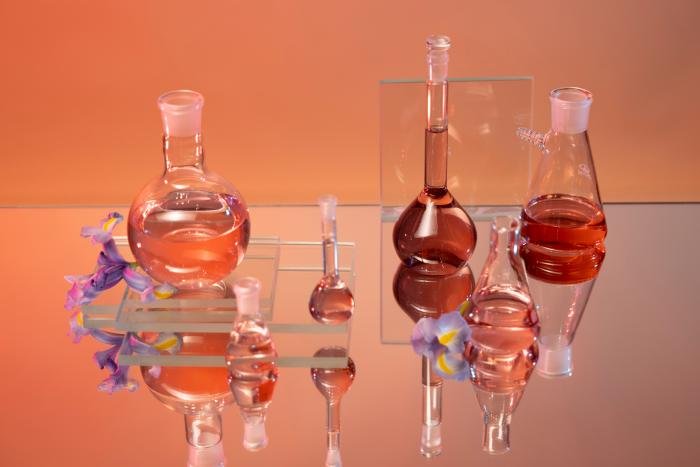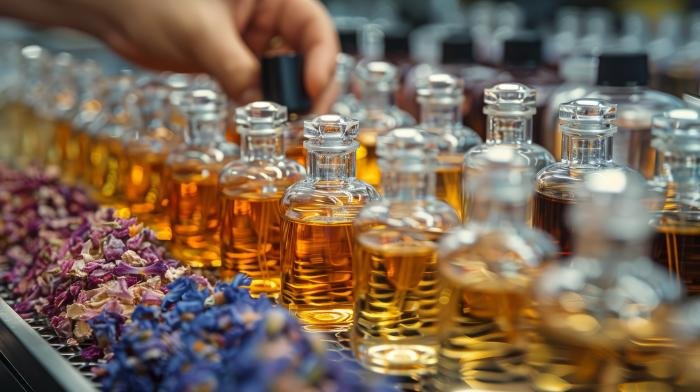Most aspiring perfumers think they need an art degree to create beautiful fragrances, but the reality is far more complex. After years of hiring perfumers and working with fragrance professionals, I’ve seen successful careers emerge from completely unexpected educational backgrounds.
Chemistry provides the strongest foundation for perfumery success, though psychology, biology, business, and even liberal arts majors can excel with proper supplemental training. The key lies in combining any undergraduate degree with specialized fragrance education and hands-on industry experience.

In my 15 years working with fragrance manufacturers worldwide, I’ve discovered that educational background matters less than passion, technical aptitude, and willingness to learn. Let me share what actually works in today’s perfumery industry.
Why Do Chemistry Majors Hold the Strongest Advantage?
Understanding molecular behavior and chemical interactions gives perfumers precise control over fragrance development and troubleshooting capabilities.
Chemistry knowledge enables perfumers to predict how aromatic molecules will interact, understand volatility rates, and create stable formulations. This technical foundation transforms fragrance creation from guesswork into systematic science.

I work daily with perfumers from different educational backgrounds, and the chemistry-trained professionals consistently demonstrate superior problem-solving abilities. When a fragrance formula fails or performs inconsistently, they can diagnose issues at the molecular level rather than relying purely on trial-and-error approaches.
Chemistry Specializations Most Valuable in Perfumery
| Chemistry Branch | Relevance Level | Key Applications | Career Advantages |
|---|---|---|---|
| Organic Chemistry | Critical | Understanding aromatic compounds | Predicting molecular behavior |
| Analytical Chemistry | Высокий | Quality control, testing | Ensuring product consistency |
| Physical Chemistry | Средний | Volatility, solubility studies | Optimizing fragrance performance |
| Biochemistry | Growing | Skin interaction research | Safety and compatibility studies |
| Materials Science | Emerging | Encapsulation technology | Innovation opportunities |
The technical depth becomes especially important when working with synthetic aromatic materials. Natural essential oils behave somewhat predictably, but synthetic compounds require deeper understanding of molecular interactions. I’ve watched chemistry-trained perfumers solve complex blending challenges in hours that take others weeks of experimentation.
What Alternative Academic Paths Lead to Fragrance Success?
Several non-chemistry majors have built outstanding perfumery careers by leveraging unique perspectives and pursuing specialized fragrance training.
Psychology majors excel at understanding emotional responses to scents and consumer behavior. Biology students bring valuable knowledge of plant chemistry and natural extraction processes. Business graduates often transition into fragrance marketing and brand development roles successfully.

The fragrance industry needs diverse talents beyond pure technical creation. Some of our most innovative projects have come from professionals who brought outside perspectives to traditional perfumery challenges. Their different educational foundations often lead to breakthrough approaches.
Alternative Majors and Their Fragrance Applications
| Academic Major | Transferable Skills | Typical Career Path | Факторы успеха |
|---|---|---|---|
| Psychology | Consumer behavior analysis | Market research, brand development | Understanding scent preferences |
| Biology/Botany | Plant science knowledge | Natural ingredient sourcing | Sustainability expertise |
| Marketing | Brand strategy skills | Product launch, consumer insights | Commercial success focus |
| Business Administration | Operations management | Company leadership roles | Strategic thinking abilities |
| Fine Arts | Creative development | Packaging design, brand identity | Aesthetic sensibility |
| Engineering | Process optimization | Эффективность производства | Technical innovation |
I know successful fragrance professionals who started as teachers, accountants, graphic designers, and musicians. What unites them is genuine curiosity about scent, dedication to learning technical aspects, and persistence in pursuing fragrance-specific education. Their diverse backgrounds often provide advantages in understanding different consumer segments or approaching creative challenges from unexpected angles.
Which Specialized Fragrance Programs Actually Matter to Employers?
Professional fragrance schools and industry certification programs provide focused training that traditional university education cannot offer.
The Grasse Institute of Perfumery, Fashion Institute of Technology’s fragrance program, and Givaudan’s training courses carry significant weight with employers. These specialized programs teach practical perfumery skills through hands-on experience with professional equipment and industry mentors.

Most universities don’t offer comprehensive fragrance education, even in their chemistry departments. Professional fragrance schools fill this critical gap with intensive, practical programs designed by industry experts who understand current market needs and technical requirements.
Leading Global Fragrance Education Programs
| Institution | Расположение | Program Type | Продолжительность | Industry Recognition |
|---|---|---|---|---|
| Grasse Institute of Perfumery | Grasse, France | Professional certification | 6-18 месяцев | Highest international prestige |
| Fashion Institute of Technology | New York, USA | Undergraduate/graduate degree | 2-4 years | Strong US industry connections |
| Givaudan Perfumery School | Argenteuil, France | Corporate training | 3-5 лет | Direct employment pathway |
| Institute for Art and Olfaction | Los Angeles, USA | Workshops and courses | Flexible schedule | Innovation and creativity focus |
| International Flavors & Fragrances | Global locations | Internship programs | 12-24 месяца | Corporate expertise development |
These programs teach skills impossible to learn in traditional academic settings. Students work with professional perfumery organs, learn industry-standard evaluation techniques, and receive mentorship from working perfumers. Many programs maintain direct placement relationships with major fragrance companies.
How Crucial Are Industry Internships Compared to Academic Credentials?
Hands-on experience in fragrance companies consistently outweighs academic achievements when employers evaluate candidates for perfumery positions.
Major fragrance houses like Firmenich, IFF, and Symrise prioritize candidates with proven industry experience over specific academic majors. Internships provide practical formulation skills, professional networks, and real-world problem-solving abilities that classroom education cannot replicate.

Throughout my hiring experience, I consistently prioritize hands-on industry exposure over academic credentials. Someone who has spent six months in a fragrance lab, understanding raw materials and learning evaluation techniques, brings more immediate value than someone with perfect grades but no practical experience.
Experience Types and Their Professional Value
| Experience Category | Immediate Impact | Long-term Potential | Employer Preference | Skills Acquired |
|---|---|---|---|---|
| Fragrance Industry Internship | Чрезвычайно высокий | Высокий | Strongly Preferred | Practical formulation abilities |
| Related Chemical Industry | Высокий | Средний и высокий | Preferred | Technical transferable skills |
| Academic Research Projects | Средний | Высокий | Secondary consideration | Theoretical foundation |
| Personal Fragrance Experimentation | Средний | Средний | Portfolio enhancement | Self-directed learning |
| Fragrance Competition Participation | Medium-Low | Средний | Interesting differentiator | Creative problem-solving |
The fragrance industry operates heavily on relationships and mentorship traditions. Internships provide access to professional networks that academic programs cannot offer. Many successful perfumers trace their career trajectories back to early internships where they met mentors who guided their professional development for decades.
What Strategic Steps Should College Students Take Regardless of Major?
Proactive planning during undergraduate studies significantly improves fragrance career prospects regardless of chosen academic concentration.
Students should pursue chemistry coursework even in non-science majors, build personal fragrance libraries, participate in industry competitions, and actively network with perfumery professionals. Summer internships and specialized workshop attendance provide essential practical foundation.

The students who successfully transition into perfumery careers treat their fragrance education as seriously as their formal coursework. They invest personal time and resources in building olfactory knowledge, even when their professors have limited understanding of perfumery as a viable career path.
Essential Development Actions by Academic Year
| Academic Year | Primary Focus | Уровень инвестиций | Expected Outcomes | Implementation Strategy |
|---|---|---|---|---|
| Freshman/Sophomore | Foundation building | $300-800 annually | Basic scent knowledge | Monthly raw material purchases |
| Junior Year | Skill development | $1000-3000 | Workshop participation | Summer intensive programs |
| Senior Year | Industry networking | Time-intensive | Professional connections | Conference attendance, LinkedIn |
| Post-graduation | Practical experience | Potential unpaid work | Industry entry | Internship applications globally |
| Продолжение | Knowledge expansion | $500-2000 annually | Continuous learning | Advanced workshops, certifications |
I advise students to begin their fragrance education immediately, regardless of their major. Some of the most talented perfumers I know started their olfactory training during college by purchasing small quantities of essential oils and aromatic chemicals. This self-directed learning demonstrates genuine passion and provides practical experience that impresses industry professionals during interviews.
Заключение
While chemistry majors hold advantages, successful perfumery careers emerge from diverse educational backgrounds when combined with specialized fragrance training, industry experience, and demonstrated passion for scent creation.




